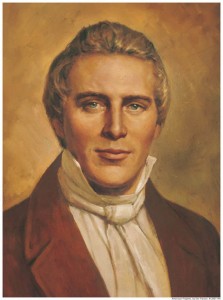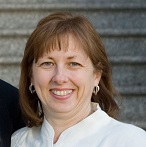Mormon Doctrine States God’s Pattern of Revelation: Prophets and Scripture
Mormon doctrine asserts belief in prophets, both ancient and modern. God, according to Mormon doctrine, desires to talk to mankind and to teach them His truth. The Apostle Peter taught that “no prophecy of the scripture is of any private interpretation. For the prophecy came not in old time by the will of man: but holy men of God spake as they were moved by the Holy Ghost” (2 Peter 1:20-21). The Bible contains a record of God’s dealings with prophets in those days, and modern scripture contains a record of God’s dealings with prophets in modern days. Mormons believe that the heavens were not closed after the Biblical record, and that God still talks to His children today, just as in days of old.
 According to Mormon doctrine, a prophet is more than just someone who tells the future. In fact, a prophet fulfills many roles. According to the Book of Revelation, “the testimony of Jesus is the spirit of prophecy” (Revelation 19:10). This means that anyone who has a testimony of Jesus as Savior and Redeemer has the spirit of prophecy. A prophet’s most important duty is to teach and testify of Jesus Christ. Prophets also receive instruction from God meant specifically for the people of that time. For instance, through His prophets, the Lord specifically listed the sins of the people of Jerusalem and warned them of their future destruction by the Babylonians.
According to Mormon doctrine, a prophet is more than just someone who tells the future. In fact, a prophet fulfills many roles. According to the Book of Revelation, “the testimony of Jesus is the spirit of prophecy” (Revelation 19:10). This means that anyone who has a testimony of Jesus as Savior and Redeemer has the spirit of prophecy. A prophet’s most important duty is to teach and testify of Jesus Christ. Prophets also receive instruction from God meant specifically for the people of that time. For instance, through His prophets, the Lord specifically listed the sins of the people of Jerusalem and warned them of their future destruction by the Babylonians.
Peter again helps us understand how God teaches His children. God selects certain persons to be witnesses of Him and of His truth, but most especially of Jesus Christ. Peter said, “We are witnesses of all things which he did both in the land of the Jews, and in Jerusalem; whom they slew and hanged on a tree: Him God raised up the third day, and shewed him openly; not to all the people, but unto witnesses chosen before of God (Acts 10:39-41). God does not reveal Himself personally to everyone, but instead chooses “witnesses” whom we call prophets.
According to Peter, Jesus Christ “commanded [these prophets/witnesses] to preach unto the people, and to testify that it is He which was ordained of God to be the Judge of quick and dead” (Acts 10:42). When people hear the words of prophets, the Holy Ghost confirms the truthfulness of this message (see Acts 10:44). Once the Holy Ghost testifies to us that the prophets’ words are true, the prophets invite us to follow Jesus by being baptized and following the commandments.
Mormon doctrine upholds the belief that God has always called prophets. The prophet Amos wrote that “the Lord God will do nothing, but he revealeth his secret unto his servants the prophets” (Amos 3:7). Paul tells us that “God hath set some in the church, first apostles, secondarily prophets, thirdly teachers, after that miracles, then gifts of healings, helps, governments, diversities of tongues” (1 Corinthians 12:28). Mormon doctrine states that Apostles are prophets also, since they teach about Jesus Christ from their personal witness of Him. Apostles are those prophets whom God places at the head of his Church. They reveal God’s word. Just as the writings of ancient prophets became scriptures, modern prophets’ words become scripture. The Doctrine and Covenants, which contains the revelations given to modern prophets, explains:
And whatsoever they shall speak when moved upon by the Holy Ghost shall be scripture, shall be the will of the Lord, shall be the mind of the Lord, shall be the word of the Lord, shall be the voice of the Lord, and the power of God unto salvation (Doctrine and Covenants 68:4, see also 2 Peter 1:20-21).
Joseph Smith and modern Prophets
The first prophet of our day was Joseph Smith. Joseph was born on December 23, 1805. As a young man growing up in upper New York, he was troubled by the conflicts and differences among the various denominations of his day. He described his feelings like this:
During this time of great excitement my mind was called up to serious reflection and great uneasiness; but though my feelings were deep and often poignant, still I kept myself aloof from all these parties, though I attended their several meetings as often as occasion would permit. In process of time my mind became somewhat partial to the Methodist sect, and I felt some desire to be united with them; but so great were the confusion and strife among the different denominations, that it was impossible for a person young as I was, and so unacquainted with men and things, to come to any certain conclusion who was right and who was wrong.
In the midst of this war of words and tumult of opinions, I often said to myself: What is to be done? Who of all these parties are right; or, are they all wrong together? If any one of them be right, which is it, and how shall I know it?
(Joseph Smith-History 1:8, 10)
Joseph described how he would often look up at the stars and ponder about God. He knew that God lived and that Jesus Christ was the Savior, but he heard so many conflicting teachings, that he could not figure out who was right or who was wrong. Finally, he began studying the Bible. One day, he read James 1:5, which says:
If any of you lack wisdom, let him ask of God, that giveth to all men liberally, and upbraideth not; and it shall be given him.
He knew that he could ask God and would not be “upbraided,” which means “scolded.” Of this experience, he said:
Never did any passage of scripture come with more power to the heart of man than this did at this time to mine. It seemed to enter with great force into every feeling of my heart. I reflected on it again and again, knowing that if any person needed wisdom from God, I did; for how to act I did not know, and unless I could get more wisdom than I then had, I would never know; for the teachers of religion of the different sects understood the same passages of scripture so differently as to destroy all confidence in settling the question by an appeal to the Bible. At length I came to the conclusion that I must either remain in darkness and confusion, or else I must do as James directs, that is, ask of God. I at length came to the determination to “ask of God,” concluding that if he gave wisdom to them that lacked wisdom, and would give liberally, and not upbraid, I might venture (Joseph Smith-History 1:12-13).
Some time later, Joseph Smith went out into the woods around his house in Palmyra, New York to pray. He prayed aloud, and at first, he felt something trying to stop him, but he gathered all his strength and continued. He said:
Just at this moment of great alarm, I saw a pillar of light exactly over my head, above the brightness of the sun, which descended gradually until it fell upon me. It no sooner appeared than I found myself delivered from the enemy which held me bound. When the light rested upon me I saw two Personages, whose brightness and glory defy all description, standing above me in the air. One of them spake unto me, calling me by name and said, pointing to the other–This is My Beloved Son. Hear Him! (Joseph Smith-History 1:16-17).
At that moment, Joseph Smith the Prophet saw in vision God and Jesus Christ. Jesus told him that his sins were forgiven and that God wanted him not to join any of the existing churches. Later Joseph would learn that he would be called to be a prophet like Moses, Isaiah, John the Baptist, or Paul. Mormons call this experience the First Vision.
Some time later, when he was praying again, an angel appeared to him and told him about a book, written on plates and buried in a hill nearby. After a few years, the angel appeared again and gave him the records. From this record, using the power of inspiration of God, Joseph translated the Book of Mormon, from which Mormons get their nickname. According to Mormon doctrine, the Book of Mormon is an ancient record telling the story of some of the inhabitants of the ancient Americas.
From the time the Book of Mormon was published in 1829 to the time of his death in 1844, Joseph Smith led the Mormon Church as a Prophet of God. During his short life, the Prophet Joseph Smith established cities, produced volumes of scriptures, and sent missionaries throughout the world. He was involved in the construction of temples, served as mayor of Nauvoo, Illinois, and was even a candidate for the presidency of the United States.
He was definitively a controversial figure in American history. Because he challenged established creeds, he attracted much persecution. On June 27, 1844, while in a jail in Carthage, Joseph Smith and his brother Hyrum were murdered by a mob made up of men with blackened faces. He was succeeded as prophet by Brigham Young.
About Anita Stansfield
Anita Stansfield began writing at the age of sixteen, and her first novel was published sixteen years later. For more than fifteen years she has been the number-one best-selling author of women’s fiction in the LDS market. Her novels range from historical to contemporary and cover a wide gamut of social and emotional issues that explore the human experience through memorable characters and unpredictable plots. She has received many awards, including a special award for pioneering new ground in LDS fiction, the Lifetime Achievement Award from the Whitney Academy for LDS Literature, and also a Lifetime Achievement Award from her publisher, Covenant Communications. She has fifty-six published books. Anita is the mother of five, and has three grandchildren.



 Watch a video about the restoration of the gospel on lds.org
Watch a video about the restoration of the gospel on lds.org
Helen, we have women who are “general authorities” in the Church. That is, they are leaders of the entire world-wide church. Women perform many leadership functions in the Church, especially because there is no paid clergy. All the leadership is called from among the members of the Church.
Some of the fastest growth in the Church is in Africa. Yes, there are a growing number of African Americans in church leadership. Go to the following website to learn more: http://www.blacklds.org.
Yes, there are prophets today, and yes, part of their role is to see those things in the future that will impact the members, and prepare them for these things. But individual Mormons can get their own glimpses into the future. Each Mormon receives what is called a “Patriarchal Blessing,” which lays out for him his lineage in Israel, and also outlines important things in his or her future. This is not fortune-telling. Whether these promises come to pass is dependent upon the faithfulness of the member. We are also entitled to personal revelation through prayer, and these personal experiences may also prepare us for future events.